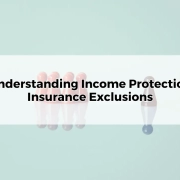Is it worth getting insurance with super?
Table of Contents
ToggleHave you ever considered getting insurance through your superannuation (super) fund? Many Australians do, as it can be a convenient and tax-effective way to protect yourself and your loved ones in the event of unexpected life events.
In this blog post, we’ll explore the pros and cons of getting insurance with super to help you decide if it’s right for you.
What is Insurance with Super?
Insurance with super is simply insurance cover that you can purchase through your super fund. This means that your insurance premiums are paid directly from your super balance, rather than from your take-home pay.
There are three main types of insurance that you can get with super:
Death cover
This pays a lump sum to your beneficiaries if you die.
Total and permanent disability (TPD) cover
This pays you a lump sum if you become totally and permanently disabled and are unable to work again.
Income protection cover
This pays you a regular income if you are unable to work due to illness or injury.
Benefits of Insurance with Super
There are several benefits to getting insurance through your superannuation (super) fund, including:
Tax-effective premiums
Insurance premiums paid from super are taxed at a lower rate than premiums paid outside of super. This is because super funds have a concessional tax rate of 15%, compared to the marginal tax rate for most Australians.
For example, if your marginal tax rate is 32.5%, you would save $17.50 for every $50 in insurance premiums that you paid from super. This can make a big difference in the long run, especially if you have a high level of cover.
Convenient and automatic payments
When you get insurance through your super fund, your premiums are automatically deducted from your super balance. This means that you don’t have to worry about making monthly payments, which can be helpful if you’re forgetful or busy.
No medical underwriting for basic cover
When you apply for basic insurance cover through your super fund, you usually don’t have to undergo medical assessments. This is because super funds offer default levels of cover that are considered to be low risk.
For example, most super funds offer a default death cover of $200,000. If you’re applying for this level of cover, you won’t be asked about your health history.
Potential for increased cover
As your needs change, you can increase your insurance coverage through your super fund. For example, if you have children, you might want to increase your death cover to protect them financially.
You can also choose to purchase additional insurance cover outside of super. This can be a good option if you need more cover than what is offered by your super fund.
Overall, insurance with super can be a convenient and tax-effective way to protect yourself and your loved ones in the event of unexpected life events.
However, it’s important to weigh the pros and cons carefully and consider your own individual circumstances before making a decision.
If you’re not sure whether or not insurance with super is right for you, it’s always a good idea to speak to a financial advisor. They can help you assess your needs and make an informed decision.
Drawbacks of Insurance with Super
There are a few drawbacks to consider when getting insurance through your superannuation (super) fund:
Impact on retirement savings
Insurance premiums reduce your super balance, so it’s important to make sure that you can afford the premiums without compromising your retirement goals.
The amount that your premiums reduce your super balance will depend on your level of cover and your age. For example, a 30-year-old with basic death cover might pay around $100 per month in premiums. This would reduce their super balance by $1,200 per year.
Limited cover options
The default levels of cover offered by super funds may not be sufficient for everyone’s needs. For example, if you have a high income or a lot of debt, you may need more death cover than what is offered by your super fund.
You may also need additional insurance cover if you have specific needs, such as trauma cover or income protection cover. Trauma cover pays out a lump sum if you suffer a serious illness or injury, such as a heart attack, stroke, or cancer. Income protection cover pays you a regular income if you are unable to work due to illness or injury.
Potential loss of cover
If you change super funds or stop contributing, you may lose your insurance cover. This is because insurance cover is usually linked to your super membership.
If you lose your super cover, you may be able to purchase cover outside of super. However, you may have to undergo medical assessments and your premiums may be higher.
Overall, it’s important to weigh the pros and cons of insurance with super carefully before making a decision.
If you’re not sure whether or not insurance with super is right for you, it’s always a good idea to speak to a financial advisor. They can help you assess your needs and make an informed decision.
Factors to Consider When Deciding
Deciding whether or not to get insurance with super is a personal one. There are a number of factors to consider, including:
Your personal circumstances
This includes your age, dependents, financial obligations, and health status.
Age
If you’re young and healthy, you may not need as much insurance cover as someone who is older or has a family.
Dependents
If you have dependents, you may want to consider getting more death cover to protect them financially in the event of your death.
Financial obligations
If you have a lot of debt, you may want to consider getting more death cover to ensure that your debts are paid off.
Health status
If you have a pre-existing health condition, you may need to pay higher premiums for insurance cover. You may also be unable to get certain types of cover.
The level of cover you require
This will depend on your individual circumstances. For example, if you have a high income or a lot of debt, you may need more death cover than someone who has a low income and no debt.
You should also consider the type of cover you need. For example, if you have a family, you may want to consider getting death cover and income protection cover. If you have a high-risk job, you may want to consider getting trauma cover.
The cost-benefit analysis
You need to weigh the cost of insurance premiums against the potential benefits of having cover.
Insurance premiums can be expensive, so it’s important to make sure that you can afford them. You should also consider the potential benefits of having cover, such as financial protection for your family in the event of your death or disability.
Insurance with super can be a valuable tool for protecting yourself and your loved ones in the event of unexpected life events. However, it’s important to weigh the pros and cons carefully and make the decision that is right for your individual circumstances.
If you’re not sure whether or not insurance with super is right for you, it’s always a good idea to speak to a financial advisor.









